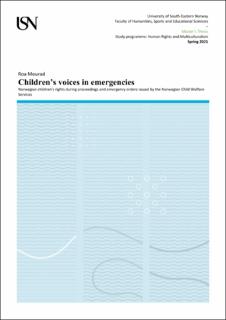| dc.description.abstract | The purpose of this dissertation is to investigate children's right to be heard in emergency orders issued by the Norwegian Child Welfare Services (Barnevernet in Norwegian) and whether the introduction of the UNCRC in Norwegian law has strengthened the Child Welfare Services' practice in this regard. I wish to investigate this through the views and experiences of children who have been relocated under emergency orders, and in the understandings of the child welfare workers. The research question is thus: Have children's right to be heard in emergency orders after the 2003 Norwegian law revision been strengthened, according to child welfare children’s and workers' experiences? Further, how can the Norwegian Child Welfare Services ensure that children's participation increases as stated in Article 12 of the UN Convention on the Rights of the Child?
This research is based on the right to be heard from Article 12 of the UN Convention on the Rights of the Child (UNCRC), Sections 4-6 and 6-3 of the Norwegian Child Welfare Act, and the data material from the project's participants. Section 4-6 concerns voluntary and coercive orders in urgent situations, and Section 6-3 concerns children's rights during proceedings. I only interviewed a few participants due to the sensitive nature of the topic. Few wanted to volunteer in such research, so I had to find alternatives to contribute with relevant information and experience.
Article 12 of the UNCRC is incorporated into Norwegian law. Violation of Norwegian laws on the right to be heard therefore also constitutes a violation of international law. What exactly is the reason for the violation of children's rights? Children are users of the Child Welfare Services. In Norway, the term "user" has been used since the 1970s when it replaced the previous term "client." The way one phrases and expresses oneself helps to create a reality. The word "client" comes from Roman times and highlights the difference between citizens and people without rights. The citizen spoke for the client; the client could not speak for himself and depended on the citizen's goodwill (Jenssen & Tronvoll, 2012, p.45). In the same period, the term "user participation" began to be used.
User participation is participation that can be understood in the sense that a service user is involved, participates, influences his or her case, the services and measures offered, and perhaps even how the system should be organized to meet the user's needs in the best possible way. My findings show that changes and developments in the Child Welfare Services have not strengthened children's statutory right to user participation. The methods used to hear children do not promote children's rights but create trauma and mistrust instead. Children's participation in Norway is still weak, even after the legislative changes in 2003 when seven-year-old children were given an unconditional right to express themselves in all matters concerning them. There are methods for strengthening children's position of participation, but they must be used and combined in order for them to work. | |
